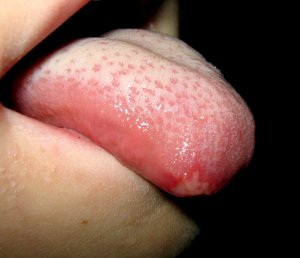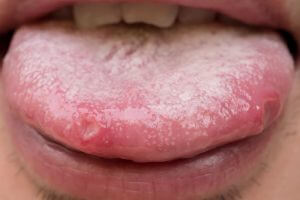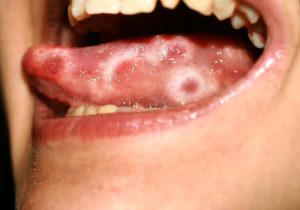What is herpes on the tongue? What causes it? And how do you treat it? Many people are familiar with cold sores that appear on the lips, but this painful chronic condition can appear inside the mouth too.
If you have herpes on your tongue, read on to learn more about this oral health issue. In this article, we’ll explore the common causes and remedies of this condition and also answer questions such as:
- What are the causes of herpes on the tongue?
- What does herpes in the mouth look like?
- Are there different stages of oral herpes? What are they?
- How can you prevent oral herpes?
- How do you treat herpes on the tongue?
In This Article
Prevalence of oral herpes
Herpes on the tongue is quite common, which makes it even more important to learn about prevention and treatment for the sake of your dental health. This infection can lead to anything from subtle irritation to blistering sores.

Many people have the herpes simplex virus because the virus is easily transmitted through skin-to-skin or oral contact. A 2012 study from the World Health Organization estimates that about 3.7 billion people under the age of 50 live with this chronic condition.
Oral herpes can occur in different areas
Oral herpes doesn’t just occur on the tongue. It can appear on the:
- Throat
- Gums
- Roof of the mouth
For some people, symptoms may even appear on the upper lip, inside the nose, or on the cheek or chin. All variations of this virus can be exceptionally painful and make you feel self-conscious. Treatment will differ based on the location and the severity.
What causes herpes on the tongue?
The primary cause of oral herpes is Herpes Simplex Virus-1 (HSV-1), commonly appearing in the form of blisters on the tongue, lips, the inner lining of cheeks, gums, and the roof of the mouth. The infection can also spread to your throat, nose, and chin.
In the video below, the herpes simplex virus is explained, what it looks like, what causes it, and more.
Although there can be multiple ways to come into contact with the HSV-1 virus, it is commonly spread through skin or oral contact. Many children are carriers of the virus. They are most likely to get infected by adults through direct contact and affectionate gestures like kissing and hugging.
The virus is highly contagious, but the infection can be asymptomatic, meaning you may never know that you have the virus. Although the infection usually spreads through direct contact, other behaviours can cause the virus to spread:
- Eating and drinking from the same utensils
- Sharing lip balms, Vaseline, and other cosmetic items
- Sharing cigarettes
- Oral intimacy
What does herpes in the mouth look like?
Herpes often leads to sores on the lips or on the tongue, but the infection doesn’t cause sores immediately. At the initial stage of the infection, you might notice flu-like symptoms and headache.
The severity of these symptoms may vary from person to person, and in many cases, the infection can be asymptomatic. Blisters can develop a few days after the infection.
In the early stages, the blisters are red and may cause itching and irritation while eating and drinking. Over the next few days, the blisters become more painful, and fluid builds up inside them. The fluid is highly contagious, but over the course of a few days, these blisters should crust over and heal.
What are the different stages of oral herpes?
Regardless of where the infection may be inside the mouth, the different stages of oral herpes are:
Initial infection

The primary stage includes exposure to the herpes virus and its reproduction, which can cause symptoms including, headache, fever, muscle pain, and gum pain.
In most cases, you may not experience any of these symptoms and might only notice irritation or a burning sensation in the infected area. Symptoms during the initial phase vary from person to person.
Latency
In the second phase, the herpes virus spreads to nervous tissue gatherings in your spine, called the dorsal root ganglia. The virus reproduces and then becomes dormant.
Re-infection or recurrence
The herpes virus can potentially hibernate in your body and you’ll never see it again. However, emotional and physical stress can suppress your immune system and trigger recurrences at any time.
How to prevent oral herpes
Medical science has always promoted prevention over treatment if possible. This is particularly important with infections like oral herpes, which have no cure. Try these strategies to avoid getting infected with the herpes HSV-1 virus:
- Avoid direct contact with an infected person: Herpes sores and blisters are visible, meaning you can easily detect them, and avoid direct contact.
- Don’t share utensils and other items: Another common cause of the herpes virus spreading is through objects. Avoid sharing things like utensils, straws, and food that can transmit the virus.
- Regularly wash common items: Another way to decrease transmission of the simplex virus is to regularly wash and sterilise shared utensils in hot water. This kills the herpes virus before it can spread.
- Avoid oral intimacy: If you or your partner is suffering from sores and blisters, oral intimacy can lead to spreading the virus to the genitals. This six-year study by the National Center of Biotechnology Information notes the ability of the herpes primary infection to spread through physical intimacy.
- Stress can lead to recurrence: The herpes HSV-1 virus can reside in your body for years with absolutely no symptoms at all. Emotional and physical stress can suppress your immune system and trigger the virus.
How do you treat herpes on your tongue?
Oral herpes on the tongue will go away on its own, but the sores can be quite painful and irritating. Consulting a doctor should always be the first step towards treatment. Usually, a topical anaesthetic can be prescribed to relieve pain as well as additional medications, depending on the severity of the symptoms.
However, there are some at-home practices to treat herpes sores on your tongue:

herpes sores
- Keep the affected area clean and dry: Keeping the affected area clean and dry will not only prevent it from spreading but also allow for a faster recovery. If you are meticulous in your care, you will find the herpes sores inside your mouth will crust faster and stop spreading.
- Natural remedies: There are plenty of natural remedies that have antiviral and antibacterial properties. Some of these include essential oils, lemon balm, milk, and petroleum jelly. Our mouthwash guide has more details.
- Over-the-counter medication: Many over-the-counter medications like Bonjela and Zorivac help with oral herpes, but make sure to read the instructions before using them. They can be bought online, and some are appropriate for children.
- Zinc oxide creams: Quite effective in treating herpes under the tongue, zinc oxide creams can be applied to deter the spread of the virus.
- Maintain good oral hygiene: A good oral routine always works wonders for common oral issues, even with chronic problems like oral herpes.
These are all remedies that don’t require a doctor’s appointment, but your symptoms may not necessarily be caused by tongue herpes. So we always recommend consulting a doctor first for a diagnosis, and treatment options.
Here’s a summary of treatments:
Action | Benefit | Approximate cost |
Consult a doctor | Doctors can prescribe you drugs that can help speed up your recovery. Seek medical advice if you are experiencing severe pain and discomfort. | The price of your perscription, depending on which UK country you are in. |
Home remedies | Natural products can help you treat oral herpes. | You may already have some of these at home. |
Over-the-counter medication | If you don’t want to go to the doctors, you can opt for over-the-counter products. Make sure you read the instructions carefully when using them. | £2.00 - £6.00 |
Good oral health routine | A good oral hygeine routine can go a long way in treating viral infections. It can also help stop them from recurring. | No more than your toothpaste, a toothbrush and floss |
Conclusion
Herpes on the tongue and other areas of the mouth is quite common in both children and adults. The contagious nature of the virus makes it difficult to avoid catching. While symptoms are not life-threatening, they can cause pain, discomfort and affect your appearance.
A lot of people who have herpes may not even know it because they rarely or never have symptoms that make viral transmission even easier.
The good news is that herpes is treatable, and if you follow care guidelines, it shouldn’t affect you or your oral health too much. However, it is a good reason to maintain good oral hygiene practices. And, if you do have it, let someone know and don’t share utensils or engage in intimate activities like kissing.
FAQs
Why am I getting sores on my tongue?
The sores that you might be seeing on your tongue may be a result of the simplex virus, which causes herpes inside the mouth. This can often be accompanied by blisters on your tongue. In addition, it can affect the lips, gums, the inner lining of your cheeks, and the roof of the mouth. These blisters gradually become fluid-filled sores.
If you are not careful, the fluid from these sores can lead to the infection spreading to other areas like your throat. The sores on the tongue or in your mouth might recur because the simplex virus can reside inactive for years in the body.
Tongue sores will generally go away after 9-10 days. If you experience severe pain and irritation while eating or drinking, consult a doctor.
Can you get oral herpes on your tongue?
The tongue is actually one of the most common areas to get infected with oral herpes. Ranging from inflamed bumps to blisters and sores, the infection can cause irritation while eating or drinking.
Since the virus is quite contagious you should refrain from sharing utensils to avoid the spread. Often, adults transfer viruses through a kiss or hug to children.
Also, for the sake of your partner’s health, use protection during oral intimacy, as it can lead to the spread of the virus to the genitals and which can lead to serious medical complications.
What does herpes on the tongue look like?
The infection may manifest starting with small, shallow, grey-coloured ulcers with a red base. Thereafter, they turn into crusted, scabbed, dry and yellow blisters. For some serious cases, a greyish coating on the tonsils may appear and the patient may also experience a sore throat with shallow ulcers.
who.int: Herpes simplex virus. Consulted 3rd May 2020.
hopkinsmedicine.org: Oral Herpes. Consulted 3rd May 2020.
ncbi.nlm.nih.gov: Six-Year Study of the Incidence of Herpes in Genital and Nongenital Cultures. Consulted 4th May 2020.
cedars-sinai.org: Herpes Simplex Virus (HSV) Mouth Infection. Consulted 4th May 2020.




